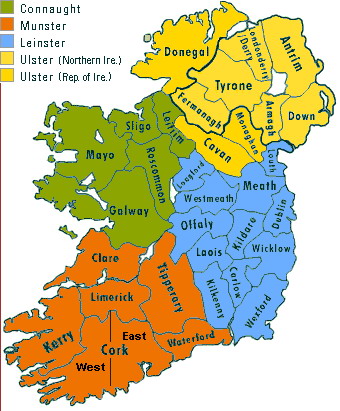TR29
Ten Tribes Tribal Report no.29
6 September 15 2009 17 Elul 5769
Irish History, Hibernian Hypocrisy, Orde Wingate and Heroism
Contents:
1. Modern Irish Historical Background
2. The Irish Were Harsher to their Own People than Israel is to the Arabs!
3. Britain. The Zionism of Orde Wingate: A Complex Origin
by Aaron Eitan Meyer
|
Brit-Am Discussion Group |
Contents by Subject |
Research Revelation Reconciliation Contribute |
|
Site Map Contents in Alphabetical Order |
This Site |
1. Modern Irish Historical Background
There were five provinces of Ireland (Ulster, Connacht, Leinster, Munster and Meath), but Meath was absorbed by Leinster so that makes four. These provinces are divided into counties. The island of Ireland consists of 32 counties of which 24 became the Irish Free State later known as the Irish Republic or as Eire. The remaining eight became Ulster i.e. Northern Ireland which remained part of the U.K.
Source of Map: |
Formerly Ireland was ruled by the British.
The Irish were strongly Roman Catholic and had their own culture whereas the British who had ruled over them were Protestant.
Arthur Griffith in the period 1905-08 set up the Sinn Fein that demanded independence from Britain.
They set up their own Parliament in Dublin. It was headed by Earmon de Valera, a US citizen with an Irish mother and unknown father.
The British attempted to suppress this movement which lead to the War of Independence of 1919-21. The Irish forces were led by Michael Collins.
In December 1921 an Anglo-Irish Treaty was signed and 26 counties gained independence as the Irish Free State. Six Ulster counties had been granted their own parliament in Belfast in 1920 and remained within the United Kingdom.
The Treaty gave Ireland independence but retained for an interrum period limited ties to Great Britain.
Ireland would recognize the British Monarch, remain in the Commonwealth, Britain would have the use of certain ports in time of war, and Ulster would have the right to refuse membership, which right it exercised.
The establishment of the Free State was followed by a civil war between the new Government (under Michael Collins) and those who opposed the Treaty lead by de Valera.
The new Irish Free State government defeated the anti-Treaty remnant of the Irish Republican Army (de Valera) but Michael Collins had been killed.
In 1932 Eamon de Valera's Fianna Fail won the general election.
Under De Valera Ireland was neutral in WW2.
During WW2,




